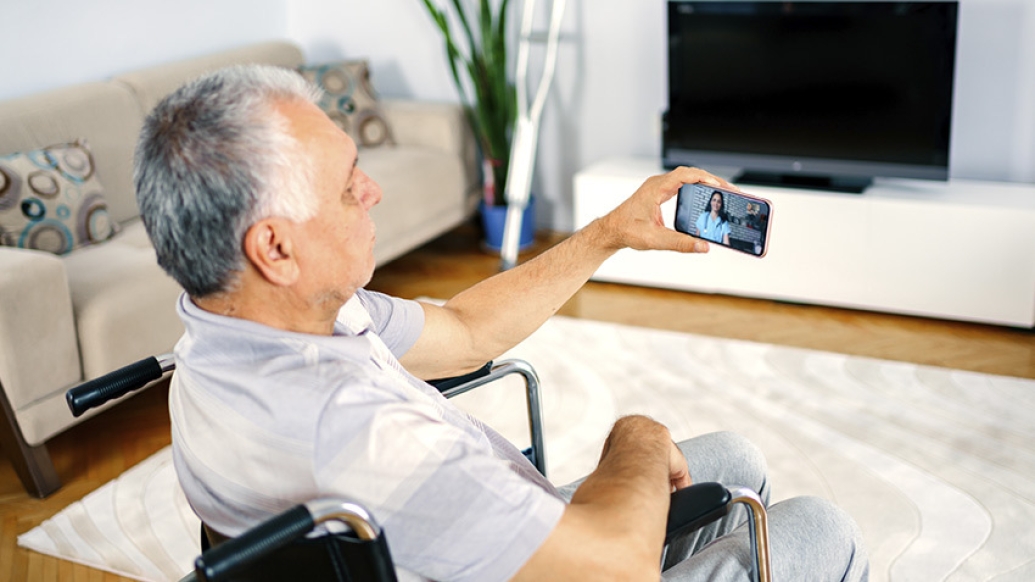Physicians, patients regard information delivery, clinic visits via video as comparable to face-to-face interactions, according to two U-M Department of Family Medicine studies.
9:50 AM
Author |

Once a rarity, video interactions between patients and medical professionals have become a necessity during the coronavirus pandemic. Additionally, those in medicine constantly seek to deliver health information in the most effective and efficient manner for patients and staff. This increasingly includes video use.
A published study from Michigan Medicine, which examined family physicians' experiences with telehealth during COVID-19, found that the majority of participating physicians agreed that video visits are a "good" alternative to face-to-face visits with patients.
In a second published study, which examined tablet video use for delivery of neonatal discharge instructions with first-time parents, U-M researchers found that participating patients considered this method of information delivery equivalent to face-to-face instructions. The brief reports were published in the journal of Family Medicine.
The video visit study led by Katherine Gold, M.D., M.S.W., M.S., an associate professor of Family Medicine and Obstetrics and Gynecology at U-M, and her Department of Medicine colleagues Anna R. Laurie, M.D., Devon Kinney, MSQM, Kathryn Harmes, M.D., M.H.S.A., and David Serlin, M.D., is among the first of its kind to examine physician experiences with telehealth.
Like Podcasts? Add the Michigan Medicine News Break on iTunes, Google Podcast or anywhere you listen to podcasts.
The National Quality Forum, a United States-based non-profit membership organization that promotes patient protections, and healthcare quality through measurement and public reporting, recommends the assessment of physician perceptions of video use as a metric in evaluating the effectiveness of telehealth. Previous research on telehealth has found high levels of satisfaction and perceptions of comparable care among patients. Video visits are also hypothesized as a way to prevent physician burnout.
Researchers administered a specially-designed survey that measured doctors' prior experience with video visits, their levels of satisfaction, barriers and impact on stress, time and documentation. A majority of eligible doctors (102 out of 109) responded to the survey. Physicians indicated high satisfaction levels using videos, with 48% expressing 'very satisfied'; 43% 'somewhat satisfied'; and most agreeing they were a good alternative to face to face visits.
"One of the unique things about the video visit study is that surveys were already poised to go out prior to the pandemic," Gold says. "When COVID hit, we had a rare opportunity to survey folks at the very earliest stages of using video visits.
"Our survey suggests that these visits are acceptable and well-received by family physicians, including those new to this type of care," Gold et al write in the brief report. "The efficiency and flexibility of video care may offer a novel way to reduce physician burnout and increase satisfaction with practice."
The tablet video for delivery of neonatal discharge instructions research was led by Kristine Cece, M.D., Ph.D., and Jane Chargot, M.D., who served as medical residents at the University of Michigan. Chargot is now an assistant professor in the Department of Family Medicine at U-M and Cece is the associate program director for the family residency program at St. Joseph Mercy Livingston. Additional authors also included Gold and Micheleen Hashikawa, M.D., an assistant professor, and Melissa Plegue, M.A., a statistician, both with the Department of Family Medicine at U-M.
The study sought to fill in research gaps about patient perceptions of video tools in the neonatal setting. Previous research found using such tools in other healthcare settings has shown to improve information retention and patient satisfaction.
MORE FROM THE LAB: Subscribe to our weekly newsletter
Researchers specifically assessed participating patients' self-rated comprehension and overall satisfaction with videos versus face-to-face interactions. Fifty-seven mothers were randomly divided into two groups, with new moms either receiving face-to-face instructions or video instructions via tablet on information including infant feeding, normal toileting, safe sleep, illness and jaundice recognition, and postpartum depression.
Both groups were able to ask a resident physician follow up questions after receiving discharge information.
Results found that there were no significant differences between groups in terms of overall satisfaction with the discharge methods and no patients reported dissatisfaction with either method. Both groups also reported increased confidence in caring for their newborn after receiving discharge instructions. The group that received instruction by tablet reported a greater increase in confidence though not significantly, the authors note. There were also no differences between the groups in terms of understanding the discharge instructions.
"Our study is the first to show that use of video discharge instructions is equivalent to face-to-face instructions given by a resident physician with respect to maternal satisfaction and self-rated comprehension," Cece et al write. "Given the expansion of online access to parenting information and the time-saving potential of video instructions, these are important findings.
"The results are encouraging in that they demonstrate that standardized patient education materials using technology such as videos are equivalent to face-to-face instruction for the outcomes studies," the authors added.
As with the research that studied physicians' perceptions of telehealth during COVID-19, the video tablet study in neonatal discharge makes note that use of video instruction also provides time-saving benefits to doctors and other medical staff.
"Our residents universally commented that they liked using the video instructions as the tasks can be repetitive and time-consuming with a busy service," Cece and the authors said, writing that video information delivery has the added benefit of maximizing efficiency for the care team.
Papers cited:
"Use of tablet video for delivery of Neonatal Discharge instructions to first-time parents," Family Medicine. DOI: 10.22454/fammed.2021.551065.
"Video Visits: Family Physician Experiences With Uptake During the COVID-19 Pandemic," Family Medicine. DOI: 10.22454/FamMed.2021.613099

Explore a variety of healthcare news & stories by visiting the Health Lab home page for more articles.

Department of Communication at Michigan Medicine
Want top health & research news weekly? Sign up for Health Lab’s newsletters today!





